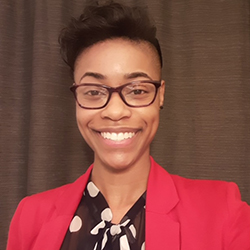Nakisha Small went to law school to become a public defender. When the time came to choose a clinic, her friend recommended the Gender Violence Clinic with Professor Leigh Goodmark because it would get her into the courtroom and provide an opportunity to build skills that she would need for her career in criminal law. What happened next was wholly unexpected and led to a 180 degree shift in her career trajectory.
From day one, Nakisha was overwhelmed by the intensity of clinic and told everyone that she hated it–including Professor Goodmark and the rest of the class. “I could never tell whether she was kidding or not when she said that,” Professor Goodmark recalls. “I like to think that she was.” Though she fully embraced the client-centered approach to lawyering taught in the clinic, she had trouble coping with the traumatic experiences of her clients and the serious implications of losing a case. Her first client sought a protective order, divorce, and custody and was absolutely devastated by the aftermath of the abuse. Every client meeting lasted five hours. Her client cried through each one and called Nakisha on her cell phone at night and on school breaks to discuss her case. This was not what Nakisha had signed up for and, filtered through a deadpan sense of humor, she let everyone know it.
As the protective order trial date approached, Nakisha asked Professor Goodmark, “Why are you making me do this? Tag me out. This is over my head, and I am terrified.” Nakisha remembers that Professor Goodmark responded, “Nakisha, you want to help people, and I can’t think of a population that needs more help.” And despite her own lack of confidence, Nakisha says that Professor Goodmark never once doubted that she would skillfully represent her client. On the day of the trial, Nakisha was sure her voice was wavering and that she would pass out. But she pushed through, and after she’d helped secure the protective order, she thought to herself, “Who was that?”
Professor Goodmark remembers that Nakisha, like many students who are trying to implement client-centered lawyering, “felt the work deeply and had trouble keeping it from spilling over into the rest of her life. Nakisha was a joy to teach, and she spent as much time making me laugh as agonizing over her case, but it was a truly difficult experience for her.”
Nakisha realizes now that she was also fighting her own growth. Although she continued to tell anyone who would listen that domestic violence work wasn’t for her, and even vowed to her classmates on the last day of clinic that she would never touch another DV case as long as she lived, she had felt a change inside her. Once she’d been exposed to working with domestic violence survivors, she couldn’t re-orient herself. At some point in her third year, after she’d had a chance to really process her clinic experience, she came around to accepting that this might become her life’s work.
No one was more shocked than Professor Goodmark. “I knew she had the skills—she and her partner litigated two multi-day protective order trials and despite her doubts about her performance, she was an outstanding litigator even as a student,” she says. “But Nakisha was very, very, clear that this was not the work for her, and I never thought I’d see her doing domestic violence work.”
Nakisha has now been at the Baltimore City State’s Attorney’s Office for five years. Since 2017, she has prosecuted cases in the Special Victims Unit. While she struggled with some aspects of her clinic experience, she credits Professor Goodmark with having given her the tools to establish boundaries and work through triggers. Nakisha knows that she can be “a confident, prepared advocate while protecting myself emotionally in what can be a very dark job.”
While there have been challenging times in her role as an Assistant State’s Attorney, Nakisha has been more resilient than her law school self would have predicted. She draws comfort from the comprehensive approach she takes to working with clients, recognizing that the case she is prosecuting is only one part of that client’s life. She asks every client, “What is your plan? What structures do you have in place to keep yourself safe?” What matters to her is that every victim has thought through these questions and has the tools to move forward, regardless of the future decisions they make regarding their relationship with their partners.
Five years removed from her clinic experience, Nakisha sees that sometimes the hardest things you do in life are also the things that can change your life. She says, with a laugh, “Don’t get me wrong, I’d never want to go back and do clinic again, but I’m so grateful for the path it set me on.”
Professor Goodmark says that when Nakisha called to say that she was joining the Special Victims Unit, “I was stunned. But I am so very glad that she is doing it. The victims that she works with are getting a prosecutor who deeply cares about their well-being, no matter what choices they make, and someone who is so thoughtful about the impact of the criminal system on victims of violence. If you had told either of us that this would be Nakisha’s future, I think we both would have laughed pretty hard—one of us more bitterly than the other—but I couldn’t be more proud of the work that she’s doing.”

